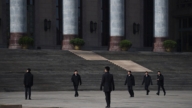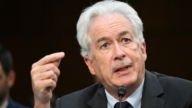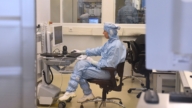【新唐人2013年09月14日訊】自英國製藥企業「葛蘭素史克」涉嫌商業行賄事件爆發後,中共當局開展了一系列針對外國企業行賄情況的調查,對此,在大陸的歐盟商會表示,中共當局的監管部門對外企的調查不公平,而且是有選擇性的。歐盟商會呼籲當局能在調查的程序上做到透明公開,對本國的企業和外企採取一視同仁的平等態度。
據《自由亞洲電臺》引述9月5號《美聯社》的報導,近段時間以來,大陸監管機構除了對「葛蘭素史克」和「賽諾菲」在內的多家外國醫藥公司,展開了賄賂調查外,還因價格壟斷問題對多家國外乳製品企業,作出巨額罰款。對此,代表了1700家歐盟駐華企業利益的最大組織——中國歐盟商會,對中共當局針對外企進行的調查舉動提出了異議。
《美聯社》引述中國歐盟商會主席大衛-庫奇諾 (Davide Cucino) 的觀點認為,中共當局針對外國企業進行的這些賄賂和所謂反壟斷價格調查,是不公平的、有選擇性的。而且大陸媒體在針對中國和外企的腐敗問題時,也沒能夠不偏不倚的報導。
北京天則經濟研究所副所長馮興元:「它對國企對外的行賄或者對內的,它的披露一直沒有。」
大陸企業觀察員何軍樵:「中國那麼多的壟斷企業,比如說中國的央企,他們基本上都是靠壟斷起家的、也是靠壟斷生存的,中國老百姓早就希望政府用反壟斷法來制裁他們,但是一直都沒有這樣做,因為壟斷企業掌握在利益集團的權貴手上,所以對於個別外國企業實施反壟斷法的制裁,這是完全有選擇性的,其背後應該是有政治的問題。」
國際反腐組織對於中共當局只問罪行賄的外企,不追責受賄的官員,這種選擇性的做法,也表示了譴責。
馮興元:「如果要懲處外企的行賄行為必然有受賄的行為,要公正透明的報導,你既然有這個行為就事情全報導,及時反應全面的情況,讓大家知道到底誰拿錢了,是自己全花了還是再轉送給哪一個政府的領導。」
《路透社》9月5號引述中國歐盟商會製藥業工作組主席Bruno Gensburger的話說,受調查的外國公司都有全球化的標準作業程序(SOPs),他們在華行為普遍是守法負責的。這一觀點得到了中外企業家和經濟學者的共識。
何軍樵:「總體來講,幾十年以來外資企業在中國基本上是非常守法的,它們不僅僅是在企業管理給中國做出了巨大的貢獻。也給中國經濟的增長做出了巨大的貢獻,至於個別企業可能有某種違法的事情,它的嚴重程度和它的普遍性、後果都遠遠比不上中國企業在違法亂紀方面的後果。」
歐盟商會主席大衛•庫奇諾指出,有些在華的外國企業可能的確存在一些腐敗現象,但歐盟企業希望中國監管機構,在處理這些腐敗問題時能夠依法行事。
何軍樵:「中國目前的問題在於執法者不守法,所以一個不守法的政府,拿起法律的大棒去制裁別人,首先就不能夠服眾。而且個別在華企業輕微的違法亂紀行為,也根本沒有代表性、沒有說服力。」
輿論認為,外國企業紛紛陷入商業賄賂危機的主要原因,是大陸根深蒂固的賄賂文化,與腐敗的商業環境,令他們不得不入鄉隨俗。
馮興元:「外企到國內在行賄,很大一部份它有制度原因,就跟民企向政府輸送利益是一樣的,都是因為政府權力太大,有些官僚繁文縟節比較多,如果要獲得一個項目批准,需要很多程序,中國也不是法治國家,那為甚麼外企在國外不需要自己國家行賄,到你們中國來就不得不行賄。」
大部份的輿論認為,大陸官員的權力尋租、行政性壟斷資源過多、政府過度干預市場、法律監管不到位等等因素,正在倒逼本來以技術研發與服務提升為主要職責的外國企業,不得不將視線轉移到對所謂行政部門和官員的賄賂上來。
採訪編輯/張天宇 後製/王明宇
Bribery Investigations in China: Foreign Companies Discriminated Against
Since allegations of commercial bribery were
brought against British company GlaxoSmithKline
(GSK) in China, the authorities have begun
investigating corruption in foreign companies.
The European Union Chamber of Commerce
(EUCC) in China commented on this issue.
The investigation into foreign companies hasn’t been
conducted in a balanced way, and has been selective.
The EUCC urged China to be
transparent during the investigation.
The domestic and foreign companies should be equal.
On September 5, Radio Free Asia cited Associated Press (AP).
Recently, Mainland China regulators carried out investigations
for possible bribery in several pharmaceutical companies.
This includes GSK and Sanofi. In addition, several foreign
dairy companies were heavily fined for “monopolizing prices".
The EUCC in China, which represents
1,700 foreign companies, raised concerns.
AP cited Davide Cucino, President of EUCC in China.
Foreign companies believe they are being unfairly singled
out for scrutiny under bribery and pricing investigations.
Cucino said foreign companies also believe
accusations against them receive more prominent
publicity from Chinese state-controlled media.
Feng Xingyuan, Deputy Director,
Beijing Unirule Institute of Economics:
“The authorities had never revealed how state-owned
enterprises bribe, both internally and externally.
It has never been mentioned."
He Junqiao, business expert in China:
“There are many company monopolies in China.
This includes state-owned companies making
fortunes from monopolies, and existing on them.
Chinese people always hope that the authorities carry
out anti-monopoly actions, to punish these companies.
However, it has never happened.
This is because the monopolising companies
are controlled by interest groups.
Investigation into foreign companies is therefore
selective, as it likely has political motive behind it."
The international anti-corruption organization condemned
the CCP for singling out foreign companies’ bribery.
This is because it didn’t investigate who accepted bribes.
Feng Xingyuan: “To punish foreign companies’ bribery,
acts there must have someone receiving the bribes.
The report should be transparent. The entire issue
needs to be completely reported in a timely fashion.
Let everyone know who accepted bribes.
Did he spend it on himself or has it been
given to any governmental official?"
On September 5, Reuters cited Bruno Gensburger, Chair
of the EUCC in China’s pharmaceutical working group.
The foreign companies that have been investigated
all have global standard operating procedures (SOPs).
They are by enlarge very responsible in their China practice.
Economist from home and abroad agree with Gensburger.
He Junqiao: “Generally, in the past few decades,
foreign companies have been law-abiding in China.
They not only had made tremendous contributions
to business management in China, but also made
great contributions to China’s economic growth.
Maybe individual companies have done something
illegal, but the severity, universality and results are
far less than Chinese companies have brought."
Davide Cucino said that foreign companies
in China may have these cases of corruption.
European companies would be satisfied
if the cases are handled according to law.
He Junjiao: “The problem in China is the
law enforcers do not abide by the law.
Thus, a non law-abiding regime, which uses rule
by law to punish others, is first of all not convincing.
Some individual foreign companies have
minor infractions, but this is not representative."
Public opinion believes foreign companies
have plunged into “commercial bribery".
The main reason is the CCP is deeply-rooted in
a “bribe culture" and corrupt business environment.
They had to “do as the Romans do".
Feng Xingyuan: “Foreign companies bribing
in China is caused by the CCP regime system.
It is just like private companies giving
away their interests to the government.
This is because the government has
too much power and bureaucracy.
If you want to get a project approved,
it requires many procedures.
The Chinese regime isn’t governed by laws.
Why is it that foreign companies don’t need to
bribe in their own countries, but have to in China?"
The majority of public opinion believes Chinese
officials abuse power, and monopolize resources.
The government excessively intervenes in the market,
and legal regulations couldn’t be implemented.
Foreign companies that are being bankrupted, and who had
considered technology development and improving services
as their main duties, have to bribe governmental officials.

























